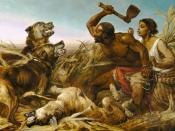Slavery and the Economy in the United States
Slavery, a cruel and horrible act, has made America a very prosperous place because of it. "Without slavery North America, the most progressive of countries, would be transformed into a patriarchal country" (p 61). Those were the words that Karl Marx wrote in 1846 in his book The Poverty of Philosophy (1846). Africans were brought over from their homelands to work in the plantations owned by white southerners. According to Henry Dodson#, "the Americas were useless without sufficient labor to exploit it...
Neither European nor Native American sources proved adequate to the task" Since the Native Americans were not sufficient enough in numbers nor the Europeans, the pressure fell upon Africa to provide the labor that would propel America's economy.
The demand for slaves increased with the benefits of the economy. More slaves meant a larger reward. A larger reward meant that slave owners would be capable of buying more slaves.
A vicious cycle was set in place that would keep growing. As the economy grew it gave greater incentives for the West Africans to capture slaves and ship them across the Atlantic. Everyone involved in the slave trade, Europeans, Portuguese, Dutch, and Africans (in Africa), were turning a profit too large for their greed to stop them. Treated as animals, the slaves were making the pockets of others full at their own expense.
According to Dodson, the invention of the cotton gin in 1793 gave slavery a new life in the United States. Alabama, Mississippi, and Louisiana became the heartland of 'King Cotton'--America's cotton kingdom. Dodson states that by the Civil War, cotton was the South's chief crop and totaled 57 percent of all U.S. exports. This boom in economy was stimulated by the labor supplied by the slaves. Without the...



With reservations, a decent attempt.
The approach of using Marx to back one's point isn't one that you see very much today; it's an interesting perspective. Although I don't agree with some of the author's conclusions, they are fairly well-stated and well-defended. The biggest flaw is the author's apparent confusion between "United States", "America" and "the Americas", terms which he seems to think are equivalent. For example, the numbers he quotes from James are for the entirety of North and South America, not for the "United States", which the title indicates to be the area of interest. Nonetheless, a good essay.
1 out of 1 people found this comment useful.